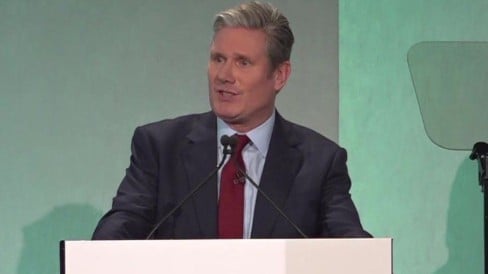
Sir Keir Starmer has warned the UK will face "huge constraints" on public spending if his party wins the next general election.
He said anyone expecting a Labour government "to quickly turn on the spending taps" would be disappointed.
It comes as a think tank claimed the average household income in the UK is 拢8,000 less than in countries such as France and Germany.
Growing the economy will be an election battleground for both major parties.
The cost of living in the UK has put the economy at the centre of political debate as inflation and high interest rates put pressure on household budgets.
The Resolution Foundation released a report on Monday claiming that "the toxic combination of slow growth and high inequality was straining the living standards of low- and middle-income Britain well before the cost of living crisis struck".
The think tank, which focuses on improving living standards, has made a series of recommendations ranging from increasing investment in public services and improving transport systems and housing outside of London.
Prime Minister Rishi Sunak has already made economic growth one of his key pledges and, speaking at the conference launching the Resolution Foundation's report, Chancellor Jeremy Hunt said his tax cuts were designed to boost the UK economy as he defended his Autumn Statement.
Mr Hunt told the conference that his decision to make tax cuts for business investment aimed to improve the UK's productivity.
"The only way in the long run that you can raise living standards is by raising productivity," he said.
While the UK has not slipped into recession, there have been concerns over weak growth. The most recent official figures show the economy failed to grow between July and September, after a succession of interest rate rises increased borrowing costs.
In a speech at the conference, Sir Keir argued that decisions taken by the government and previous Conservative administrations over the past 13 years "will constrain what a future Labour government can do".
"We are in a hole, no doubt about it," he said.
"Taxes [are] higher than at any time since the war, none of which was true in 2010. Never before has a British government asked its people to pay so much, for so little," the Labour leader said.
Sir Keir added economic growth "will have to become Labour's obsession if we are to turn around the economy", which he admitted "had not always been the Labour Party's comfort zone".
But he said economic growth "must better serve working people. And must raise living standards in every community".
Last month, Labour was forced to deny claims it could further water down its flagship green prosperity plan, after a senior source had suggested to the BBC that the level of investment previously promised - of 拢28bn a year - might never be reached.
In June, shadow chancellor Rachel Reeves said the 拢28bn pledge would not be met at the beginning of a Labour term of government. A senior source in the Labour leader's office said the decision was made because of the state of the public finances.
Asked whether a Labour administration would avoid cuts to government department budgets, Sir Keir said while he was "not in the business of cutting the funding", public services did require reform.
A Conservative spokesman said Labour's policy "presents a major risk" to the British economy at a time when the cost of borrowing is "so high".
Sir Keir said Labour would be "ruthless when it comes to spending every pound wisely", saying he was offering "a counsel of realism, not despair".
In step with Mr Hunt, Sir Keir outlined plans which include changing "restrictive planning laws" to build more houses and infrastructure.
He declared Labour would secure "a new deal to make work pay with increased mental health support, a fully-funded plan to cut NHS waiting lists, an end to zero-hour contracts, no more fire and rehire, a bold new act to stamp out racial injustice - and a real living wage".
The government has announced it will increase the minimum wage by more than a pound to 拢11.44 next April, but the government's forecaster, the Office for Budget Responsibility (OBR), has said living standards are also not expected to return to pre-pandemic levels until 2027-28.
Critics have argued for increased investment in public services, but the chancellor argued he inherited an "incredibly difficult situation" in the aftermath of former Prime Minister Liz Truss's tenure.
"I don't think you want declining public investment, and I hope we get to a place where we don't have that," Mr Hunt told the conference.
He said reforming the country's planning system as well as reforms to the welfare system would help to boost economy growth.
But his changes announced in the Autumn Statement will not prevent tax levels staying at their highest level on record and economic growth is forecast to be sluggish.